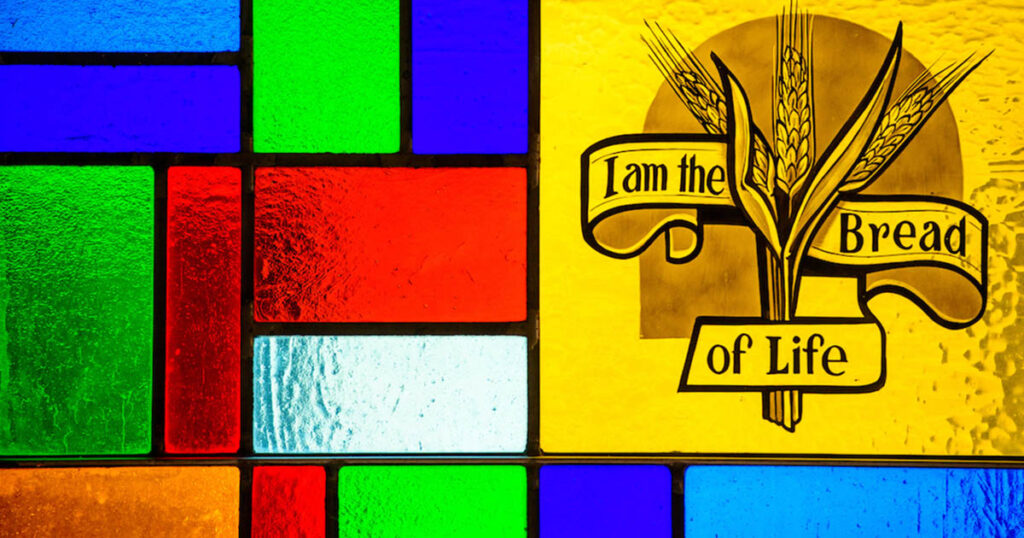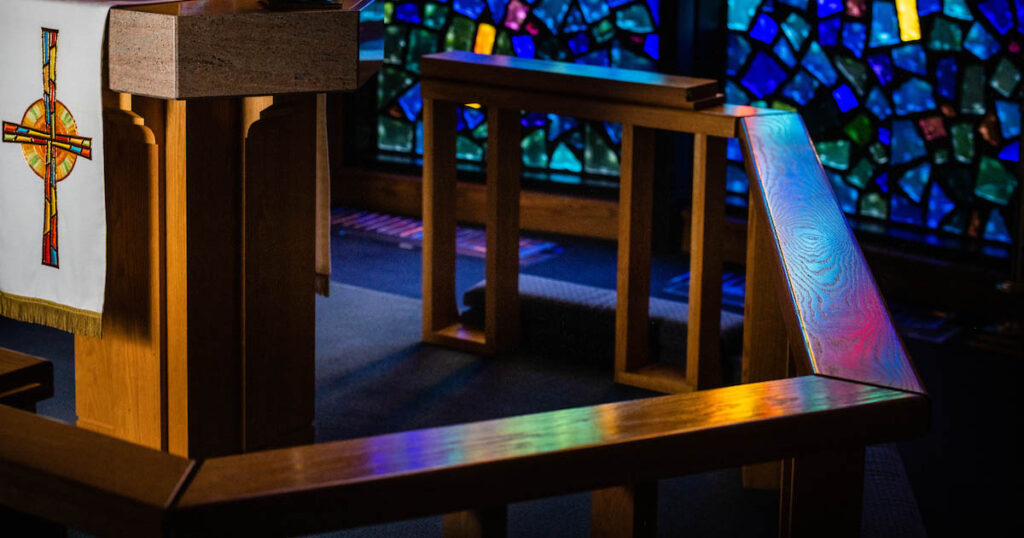2. Do you always need what Jesus does in the Sacrament?
This marvelous truth is foundational for Holy Communion: The living Christ, here and now, in the flesh, does this. “Why should He serve His gathered guests each Lord’s Day?” In part, because His gathered guests are real sinners. His very name was given with our sins in view (Matt. 1:21), and Jesus walked to Calvary to receive our due for sin. Let us consider the forgiveness of sins He bestows at His altar.
Jesus taught us to pray the Fifth Petition of the Lord’s Prayer daily because of our daily need for God’s forgiveness. We have lost God’s image; we are no longer holy, as He created us. We are broken, not whole. We are twisted, not straight. We are rebels, not conformists to God’s holy will.
The “Christian Questions and Answers” portion of Luther’s Small Catechism gets directly at this disease by asking: “Do you believe that you are a sinner?” It does not begin with specific sins, but with the mother lode: Adam’s image. In the Large Catechism, Luther writes: “[I]n God’s presence all must tuck their tails and be glad that they can gain forgiveness. In short, if God does not forgive without stopping, we are lost” (LC III 90, 91).
“Why should the living Christ do this for His gathered guests each Lord’s Day?” Because His guests need His forgiveness each Lord’s Day. A “good” week does not make a Christian less sinful. A “bad” week does not make a Christian more sinful. A Christian examines his life in light of the Ten Commandments, but not to tabulate a list of sins of which we may or may not be aware. Rather, the Christian examines his life to repent of his sinful condition.
True repentance
We cannot manufacture true repentance. True repentance starts as God unleashes His holy Law on the human heart:
This is God’s thunderbolt. By the Law He strikes down both obvious sinners and false saints. He declares no one to be in the right, but drives them all together to terror and despair. This is the hammer. As Jeremiah says, “Is not My Word like…a hammer that breaks the rock in pieces?” (23:29). This is not active contrition or manufactured repentance. It is passive contrition, true sorrow of heart, suffering, and the sensation of death. This is what true repentance means. Here a person needs to hear something like this, “You are all of no account, whether you are obvious sinners or saints in your own opinions. You have to become different from what you are now. You have to act differently than you are now acting, however great, wise, powerful, and holy you try to be. Here no one is godly.”
(SA III III 2–3)
You have to become different, yet you have no power within yourself to do so before God. You have to act differently than you are now acting. Everyone! To do so, the strength must come from outside of you, from God. God gives this repentance by the preaching of His Word. He sends His thunderbolt, the holy hammer of His Law, and crushes the sinful heart. As He does so, He also prepares sinful hearts to receive the Gospel of forgiveness and life. But if such strength and forgiveness come from God’s proclaimed Word, why should we receive the Sacrament as well?
This question once again shifts the Sacrament away from Jesus’ doing to ours. What Christ loves to do (give to us) is pushed aside. “Why should we receive?” It’s almost as if we can measure out God’s grace just so, to strengthen ourselves just enough. This week I feel like I need God’s holy body and blood with the treasures of heaven He delivers, but maybe next week I won’t feel the need. Seeking to measure our need for God’s gifts of grace with our feelings is perilous.
Jesus did not measure according to our feelings or in a limited way when He said to forgive seventy times seven. Jesus did not measure partially or with reservation when, from the cross, He said, “Father, forgive them.” Since questions about the Sacrament are rightly asked with God as the doer of the verbs, the question “Why should we receive?” is best replaced with the question “Why should the living Christ do this for us?” Answer: Because from His fullness comes grace upon grace (John 1:16), the immeasurable riches of God’s grace (Eph. 2:7). Our Lord loves to give and His grace is beyond measuring. There is nothing partial or limited in His giving or forgiving. Our sin from one man’s trespass is present every Sunday — and beyond measuring. The abundance of grace the one man, Jesus Christ, comes to serve us at His Table is also beyond measuring. Our need cannot be measured with our feelings. Our need is constant. So is the blessing and beauty of His gracious giving in His promised gifts.
Omissions and commissions
Sometimes we begin to sense our astounding need. Sometimes our lack of hallowing God’s Name, of seeking His kingdom and His will, our lack of contentment, our lack of trust in God and gratitude toward God, our slowness in prayer, our lack of love for our neighbor, our lack of fulfilling our vocational duties, our slinking from suffering, our refusal to confess our fault — sometimes these things produce guilt in our conscience. Sometimes we begin to get it, and we hate our lack of obedience.
Sometimes the sin that fills us crushes what we lack. Coveting, pride, impatience, lust, sinful anger, an untamed tongue, an undisciplined body, a cold heart, a mind divided by worry, self-pity, self-promotion, blame-passing and wasted opportunities shroud our conscience in overwhelming ugliness. We begin to see it. Our conscience connects the dots, the sinful stains, and we hate what we have done. Other times, however, we mistakenly think our works meet the mark (James 2:10).
Sometimes we sense neither the depth of our omissions nor the mountainous height of our commissions. Sometimes, we are clueless, numb in our feeling, slow in our thinking, confused or cloudy in our conscience, just keeping on keeping on.
No matter the state of our conscience, we never sense all our sin, errors and faults before God’s holiness. As we learned from the catechism, “What sins should we confess? Before God we should plead guilty of all sins, even those we are not aware of, as we do in the Lord’s Prayer.” Our confessions also quote Psalm 19:12 with frequency, “Who can discern his errors? Declare me innocent from hidden faults.” The Confessions state that “most sins we neither remember nor understand” (Ap XI 65).
Create in me a clean heart
Jesus, however, sees them all. “The Lord looks on the heart” (1 Sam. 16:7) and knows what comes out of it (Matt. 15:19). Therefore we approach the Lord’s Supper singing the Offertory, “Create in me a clean heart, O God.”The living Christ, here and now, in the flesh, comes among us with His holy body and His holy blood because of our heart problem.
Our wicked hearts may tempt us to leave the Sacrament of the Altar with false hope. We may hope that we can return next time more meritorious to approach the Table of the Lord. We may hope that with enough time and effort we will be worthy of a seat at His Table.
We should surely seek to amend our sinful lives, before Christ serves us again in Holy Communion. But not to merit a better seat at His Table. We will never get right in this life what only God’s forgiveness in Christ makes right. Our efforts to live in repentance and turn from sin flow from faith that the Lord, through His sacrificed body and His shed blood, makes us fully right before God.
The hymn stanza helps us see. It confesses:
You see my sin yet seat me at Your table;
(LSB 635:3)
Lord, as a guest, I surely am the least:
Unclean, unfit, of worthy deeds unable —
My heart prepare for this most holy feast,
My heart prepare for this most holy feast.
Indeed, “Create in me a clean heart, O God, and renew a right spirit within me” (LSB, p. 192–93).
Gospel healing
Being turned to God in true repentance begins as God’s holy Law is unleashed on the human heart. It continues as the heart receives healing through God’s holy Gospel.
But to this office of the Law, the New Testament immediately adds the consoling promise of grace through the Gospel. This must be believed. As Christ declares, “Repent and believe in the Gospel” (Mark 1:15). That is, become different, act differently, and believe My promise. … The Gospel brings consolation and forgiveness. It does so not just in one way, but through the Word and the Sacraments.
(SA III III 4, 8)
Our Lord of plentiful redemption wants to come among us with His food of forgiveness on our day of rest because He loves us. He who rested on the seventh day of creation invites us to His Table with the sweetest of invitations: “Come to me, all who labor and are heavy laden, and I will give you rest” (Matt. 11:28; see LC V 66). His tender summons exhorts us for our highest good. Here, He gives rest from that futile effort of trying to mop up the sloppy stains of our sin. He even removes the sin we fail to recognize (Psalm 130:3–4). The blood the Lord gives you to drink received in faith cleanses you from all sin (1 John 1:7). The splendid truth is that the living Christ, here and now, in the flesh, does this.
The gifts are in the feast,
(LSB 602:5)
Gifts far more than we see;
Beneath the bread and wine
Is food from Calvary.
The body and the blood
Remove our ev’ry sin;
We leave His presence in
His peace, renewed again.






We are in need of Lord’s Supper, “as the deer panteth…”; we too, in times of this pandemic (COIVID-19)! Maranatha! Come Lord Jesus!
I need the Sacrament as often as it is given. His Gift is far more than I deserve. I can , nor, do I need to do ANYTHING on my own.